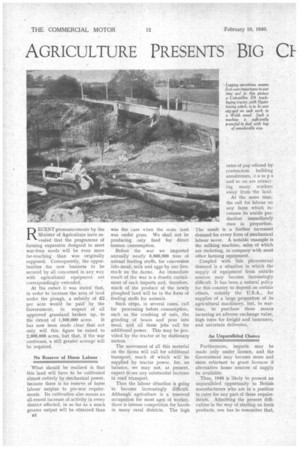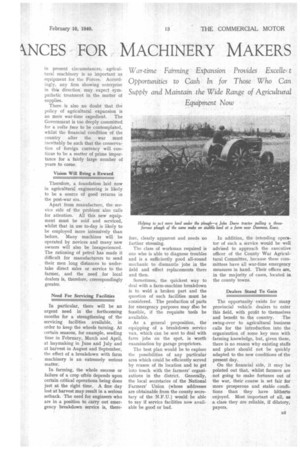AGRICULTURE PRESENTS BIG Cl k.NCES FOR MACHINERY MAKERS R ECENT pronouncements
Page 28

Page 29

If you've noticed an error in this article please click here to report it so we can fix it.
by the Minister of Agriculture have revealed that the programme of farming expansion designed to meet war-time needs will be even more far-reaching than was originally supposed. Consequently, the opportunities for new business to be secured by all concerned in any way with agricultural equipment are correspondingly extended.
At the outset it was stated that, in order to increase the area of land under the plough, a subsidy of £2 per acre would be paid by the Government, in respect of all approved grassland broken up, to the 6:tent of 1,500,000 acres. It has now been made clear that not only will this figure be raised to 2,000,000 acres, but that, if the war continues, a still greater acreage will be required.
No Reserve of Horse Labour What should be realized is that this land will have to be cultivated almost entirely by mechanical power, because there is no reserve of horse labour surplus to pre-war requirements. Its cultivation also means an all-round increase of activity in every district affected, in so far is a much greater output will be obtained than B2 was the case when the same land was under grass. We shall not be producing only food for direct human consumption.
Before the war we imported annually nearly 8,000,000 tons of animal feeding stuffs, for conversion into meat, milk and eggs by our livestock on the farms. An immediate result of the war is a drastic curtailn2ent of such imports and, therefore, much of the produce of the newly ploughed land will be in the form of feeding stuffs for animals.
Such crops, in several cases, call for processing before consumption, such as the crushing of oats, the grinding of beans and peas into meal, and all these jobs call for additional power. This may be provided by the tractor or by stationary motors.
The movement of all this material on the farms will call for additional transport, much of which will be supplied by tractor power, for, on balance, we may not, at present, expect th see any substantial increase in road transport.
Then the labour situation is going to become increasingly difficult. Although agriculture is a reserved occupation for most ages of Worker, there is intense competition for hands in many rural districts. The high rates of pay offered by contractors building aerodromes, camps and so on are attracting many workers away from the land.
At the same time, the call for labour on any farm which increases its arable production immediately rises in proportion. The result is a further increased demand for every form of mechanical labour saver. A notable example is the milking machine, sales of which are rocketing, in company with most other farming equipment.
Coupled with this phenomenal demand is a situation in which the supply of equipment from outside sources may become increasingly difficult. It has been a natural policy for this country to depend on certain others, notably the U.S.A., for supplies of a large proportion of its agricultural machinery, but, in wartime, to purchase these means incurring an adverse exchange value, high rates for freight and insurance, and uncertain deliveries.
An Unparalleled Chance Furthermore, imports may be made only under licence, and the Government may become more and more reluctant to grant licences if alternative home sources of supply be available.
Thus, 1940 is likely to present an unparalleled opportunity to British manufacturers who are in a position to cater for any part of these requirements. Admitting the present difficulties in the way of starting on fresh products, one has to remember that, in present circumstances, agricultural machinery is as important as equipment for the Forces. Accordingly, any firm showing enterprise in this direction may expect sympathetic treatment in the matter of supplies.
There is also no doubt that the policy of agricultural expansion is no mere war-time expedient. The Government is too deeply committed for a volte face to be contemplated, whilst the financial condition of the country after the war must inevitably be such that the conservation of foreign currency will continue to be a matter of prime importance for a fairly large number of years to come.
Vision Will Bring a Reward
Therefore, a foundation laid now in agricultural engineering is likely to be a source of good returns in the post-war era.
Apart from manufacture, the service side of the problem also calls for attention. All this new equipment must be sold and serviced, whilst that in use to-day is likely to be employed more intensively than before. Many machines will be operated by novices and many new owners will also be inexperienced. The rationing of petrol has made it difficult for manufacturers to send their men long distances to undertake direct sales or service to the farmer, and the need for local dealers is, therefore, correspondingly greater.
Need For Servicing Facilities In particular, there will be an urgent need in the forthcoming months for a strengthening of the servicing facilities available, in order to keep the wheels turning. At certain seasons, for example, seeding time in February, March and April, at haymaking in June and July and at harvest in August and September, the effect of a breakdown with farm machinery is an extremely serious matter.
In farming, the whole success or failure of a crop often depends upon certain critical operations being done just at the right time. A fine day lost at harvest may result in a serious setback. The need for engineers who are in a position to carry out emergency breakdown service is, there
fore, clearly apparent and needs no further stressing.
The class of workman required is one who is able to diagnose troubles and is a sufficiently good all-round mechanic to dismantle jobs in the field and effect replacements there and then.
Sometimes, the quickest way to deal with a farm-machine breakdown is to weld a broken part and the question of such facilities must be considered. The production of parts for emergency purposes may also be feasible, if the requisite tools be available.
As a general proposition, the equipping of a breakdown serviez van, which can be sent to deal with farm jobs on the spot, is worth examination by garage proprietors.
The best plan would be to explore the possibilities of any particular area which could be efficiently served by reason of its location and to get into touch with the farmers' organizations in the district. Generally, the local secretaries of the National Farmers' Union (whose addresses are obtainable from the county secretary of the N.F.U.) would be able to say if service facilities now available be good or bad.
In addition, the intending operator of such a service would be well advised to approach the executive officer of the County War Agricultural Committee, because these committees have all war-time emergency measures in hand. Their offices are, in the majority of cases, located in the county towns.
Dealers Stand To Gain
The opportunity exists for many provincial vehicle dealers to enter this field, with profit to themselves and benefit to the country. The swing-over to agricultural business calls for the introduction into the organization of some key men with farming knowledge, but, given these, there is no reason why existing staffs and plant should not be quickly adapted to the new conditions of the present day.
On the financial side, it may be pointed out that, whilst farmers are not going to make fortunes out of the war, their course is set fair for more prosperous and stable conditions than they have hitherto enjoyed. Most important of all, as a class they are reliable, if dilatory, payers.




























































